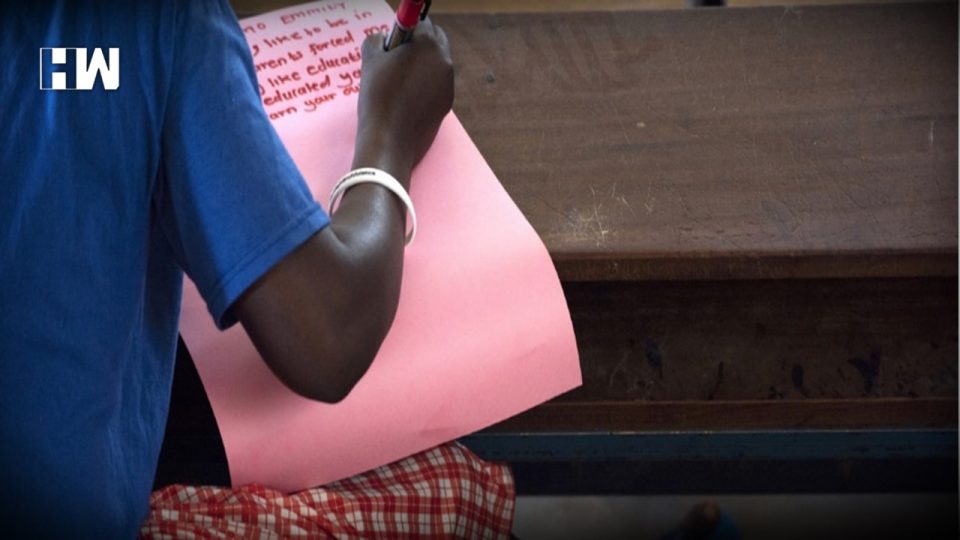The United Nations has called for collaboration at all levels, and across all sectors of society, to protect millions of girls and women at risk of female genital mutilation (FGM) every year.
The United Nations has called for collaboration at all levels, and across all sectors of society, to protect millions of girls and women at risk of female genital mutilation (FGM) every year.
The need is even more pressing amid concerns that two million additional cases of FGM may occur over the next decade as the coronavirus pandemic shutters schools and disrupts programmes that help protect girls from the harmful practice.
In a message commemorating the International Day of Zero Tolerance for Female Genital Mutilation, Secretary-General António Guterres highlighted that by working together, “we can eliminate female genital mutilation by 2030.”
“As the United Nations embarks on a Decade of Action to deliver the Sustainable Development Goals, let’s make this the decade of zero female genital mutilation”, he said.
“Doing so will have a positive ripple effect on the health, education and economic advancement of girls and women”, Mr. Guterres added.
Gender equality, ending FGM ‘mutually reinforcing’
The heads of the UN Children’s Fund (UNICEF) and the UN Population Fund (UNFPA) also highlighted that eliminating FGM and achieving gender equality are interdependent, mutually reinforcing goals.
“Simply put, if gender equality were a reality, there would be no FGM. This is the world we envision”, UNICEF Executive Director Henrietta Fore and UNFPA Executive Director Natalia Kanem said in a joint statement.
They urged strong collaboration and unity, at all levels and across all sectors, as well as adequate funding and decisive action to protect girls and women at risk.
“We know what works. We tolerate no excuses. We have had enough of violence against women and girls. It is time to UNITE around proven strategies, FUND them adequately and ACT”, they stressed.
Abhorrent practice, with severe consequences
A harmful and abhorrent practice that amounts to a human rights violation, FGM – also called cutting – involves the partial or total removal of the external female genitalia for no medical reason. In cultures that condone FGM, it is usually performed by a traditional practitioner with crude instruments and without anesthetic.
It results in severe physical and mental health consequences for girls and women. Complications include severe pain, hemorrhaging, sepsis, urethra damage, painful sexual intercourse and other sexual dysfunction. Genital mutilation also has psychological repercussions, with many victims feeling anxious, depressed, incomplete and traumatized.
‘Small price’ for ‘ambitious commitment’
,
Even before COVID-19 upended progress, the Sustainable Development Goals (SDGs) target (Goal 5, target 3) of ending female genital mutilation by 2030 was an “ambitious commitment”, according to UNICEF and UNFPA.
UN News Podcast
‘No doubt we will end FGM’: UN Women Goodwill Ambassador
,
Even in countries where the practice is already declining, progress needs to increase ten-fold to meet the global target within the timeframe, they said. Achieving the goal by 2030 will require about $2.4 billion over the next 10 years – less than $100 per girl.
“This is a very small price to pay for preserving a girl’s bodily integrity, her health and her right to say ‘no’ to violation”, highlighted Ms. Fore and Dr. Kanem.
‘Crucial role’ of men and boys
Ms. Fore and Dr. Kanem also underscored the need for unity and collaboration among a wide group of stakeholders, including civil society, grassroots organizations, women’s rights groups, teachers, health workers, law enforcement and judicial officials, as well as religious leaders and elders.
Alongside, men and boys “also have a crucial role to play”, they stressed, urging efforts to “amplify the powerful and persuasive voices of survivors who are increasingly leading transformative change in their communities.”
The International Day
Commemorated every year on 6 February, the International Day of Zero Tolerance for Female Genital Mutilation aims to amplify and direct the efforts on the elimination of FGM. It was designated by the UN General Assembly in 2012.
This year, the International Day is being marked under the theme “No Time for Global Inaction: Unite, Fund, and Act to End Female Genital Mutilation.”
As an independent media platform, we do not take advertisements from governments and corporate houses. It is you, our readers, who have supported us on our journey to do honest and unbiased journalism. Please contribute, so that we can continue to do the same in future.

